
Richard Joseph Daley was an American politician who served as the mayor of Chicago from 1955, and the chairman of the Cook County Democratic Party from 1953, until his death. He has been called "the last of the big city bosses" who controlled and mobilized American cities. He was the patriarch of a powerful Chicago political family. His son, Richard M. Daley, would also go on to serve as mayor of Chicago and another son, William M. Daley, served as the United States Secretary of Commerce and White House Chief of Staff.

Richard Michael Daley is an American politician who served as the 54th mayor of Chicago, Illinois, from 1989 to 2011. Daley was elected mayor in 1989 and was reelected five times until declining to run for a seventh term. At 22 years, his was the longest tenure in Chicago mayoral history, surpassing the 21-year mayoralty of his father, Richard J. Daley.
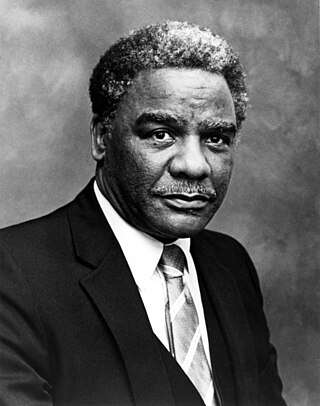
Harold Lee Washington was an American lawyer and politician who was the 51st Mayor of Chicago. Washington became the first African American to be elected as the city's mayor in April 1983. He served as mayor from April 29, 1983, until his death in 1987. Born in Chicago and raised in the Bronzeville neighborhood, Washington became involved in local 3rd Ward politics under Chicago Alderman and future Congressman Ralph Metcalfe after graduating from Roosevelt University and Northwestern University School of Law. Washington was a member of the U.S. House of Representatives from 1981 to 1983, representing Illinois's first district. Washington had previously served in the Illinois State Senate and the Illinois House of Representatives from 1965 until 1976.
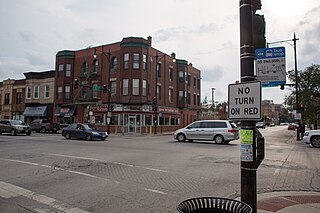
Bridgeport is one of the 77 community areas in Chicago, on the city's South Side, bounded on the north by the South Branch of the Chicago River, on the west by Bubbly Creek, on the south by Pershing Road, on the east by the Union Pacific railroad tracks, and on the northeast by the Dan Ryan Expressway. Neighboring communities are Pilsen across the river to the north, McKinley Park to the west, Canaryville to the south, and Armour Square to the east. Bridgeport has been the home of five Chicago mayors. Once known for its racial intolerance, Bridgeport today ranks as one of the city's most diverse neighborhoods.

Rogers Park is a community on the North Side of Chicago, Illinois and one of the city's 77 municipally recognized community areas. Located 9 miles (14 km) north of the Loop along the shore of Lake Michigan, it features green spaces, early 20th-century architecture, live theater, bars, restaurants, and beaches. Rogers Park is known for its racial and cultural diversity: according to the Chicago Sun-Times, it is the community that most closely matches the city's ethnic makeup as a whole.
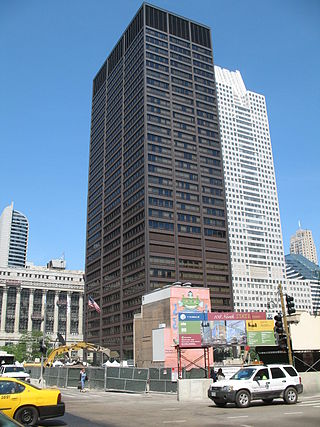
The Richard J. Daley Center, also known by its open courtyard Daley Plaza and named after longtime mayor Richard J. Daley, is the premier civic center of the City of Chicago in Illinois. The Center's modernist skyscraper primarily houses offices and courtrooms for the Cook County Circuit Courts, Cook County State's Attorney and additional office space for the City and the County. It is adjacent to the neoclassical City Hall-County Building, also on the plaza. The open granite-paved plaza used for gatherings, protests, and events is also the site of the Chicago Picasso, a gift to the city from the artist.

Chicago has played a central role in American economic, cultural and political history. Since the 1850s Chicago has been one of the dominant metropolises in the Midwestern United States, and has been the largest city in the Midwest since the 1880 census. The area's recorded history begins with the arrival of French explorers, missionaries and fur traders in the late 17th century and their interaction with the local Potawatomi Native Americans. Jean Baptiste Point du Sable, a black freeman, was the first permanent non-indigenous settler in the area, having a house at the mouth of the Chicago River by at least 1790, though possibly as early as 1784. The small settlement was defended by Fort Dearborn after its completion in 1804, but was abandoned as part of the War of 1812 in expectation of an attack by the Potawatomi, who caught up with the retreating soldiers and civilians not two miles south of the fort. The modern city was incorporated in 1837 by Northern businessmen and grew rapidly from real estate speculation and the realization that it had a commanding position in the emerging inland transportation network, based on lake traffic and railroads, controlling access from the Great Lakes into the Mississippi River basin.
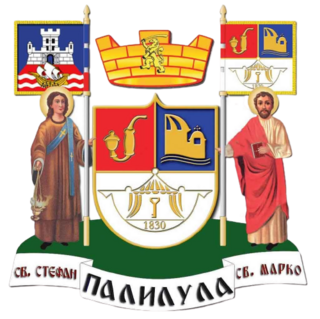
Palilula is a municipality of the city of Belgrade. It has the largest area of all municipalities of Belgrade. The core of Palilula is close to the center of the city, but the municipality also includes sparsely populated land left of the Danube.
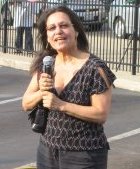
Helen Shiller is a former Alderman of the 46th ward in Chicago, Illinois. Shiller is also a published author, having written a 500-page book on her politics and activism in Chicago from 1971 to 2011. Shiller served in the Chicago City Council for six four-year terms, from 1987 to 2011. Shiller was elected to the City Council on her third attempt, as Harold Washington, Chicago's first black Mayor, was re-elected to his second term, and her election as alderman helped close the Council Wars era in Chicago government. Shiller has been described as "a reformer unafraid to take on the boys in power." A less flattering description is that she is "committed to liberal causes and destroying all within her path". Among her most significant impacts on Chicago were her advocacy for diverse, inclusive, affordable housing and helping craft Chicago's response to the HIV/AIDS crisis. Her commitment to fostering community development without displacement often brought Shiller into contention with some constituencies, real estate developers, and editorial boards. Shiller's oral history was collected by Pulitzer Prize-winning author and Uptown resident Studs Terkel in his 2003 book, Hope Dies Last. As she details in her own book, among her policy victories as a City Council member was: getting human rights legislation passed, having Chicago implement anti-apartheid legislation, creating a City Council Subcommittee on Domestic Violence, and building a unique mix-used development.
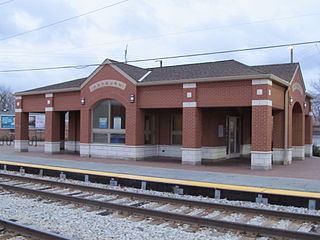
Ashburn, one of Chicago's 77 community areas, is located on the south side of the city. Greater Ashburn covers nearly five square miles. The approximate boundaries of Ashburn are 72nd Street (north), Western Avenue (east), 87th Street (south) and Cicero Avenue (west).

Maxwell Street is an east–west street in Chicago, Illinois, that intersects with Halsted Street just south of Roosevelt Road. It runs at 1330 South in the numbering system running from 500 West to 1126 West. The Maxwell Street neighborhood is considered part of the Near West Side and is one of the city's oldest residential districts. It is notable as the location of the celebrated Maxwell Street Market and the birthplace of Chicago blues and the "Maxwell Street Polish", a sausage sandwich. A large portion of the area is now part of the campus of the University of Illinois at Chicago (UIC) and a private housing development sponsored by the university.

The Chicago Picasso is an untitled monumental sculpture by Pablo Picasso in Daley Plaza in Chicago, Illinois. The 1967 installation of The Picasso, "precipitated an aesthetic shift in civic and urban planning, broadening the idea of public art beyond the commemorative."
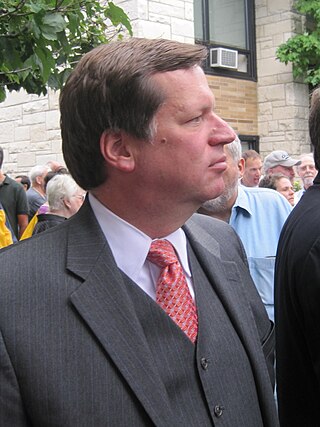
Joseph A. Moore is a former Chicago politician. Moore was first elected to Chicago City Council as the alderman for the 49th ward, which includes the majority of Rogers Park and portions of West Ridge, in 1991. Moore won re-election six times, before losing to challenger Maria Hadden in 2019.
The proposed Chicago south suburban airport is a proposed airport that would be located in Peotone, Illinois, United States, approximately 40 miles (64 km) south of Chicago. Serving in addition to the two international commercial airports serving Chicago, the site would serve the south suburbs of the Chicago metropolitan area. The two existing airports currently serving Chicago are located within and operated by the City of Chicago, with the Northern Illinois region also served by two other international airports in Illinois and Wisconsin.
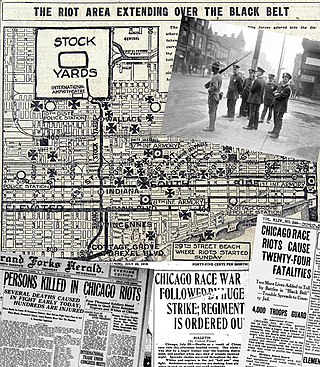
The Chicago race riot of 1919 was a violent racial conflict between white Americans and black Americans that began on the South Side of Chicago, Illinois, on July 27 and ended on August 3, 1919. During the riot, 38 people died. Over the week, injuries attributed to the episodic confrontations stood at 537, two-thirds black and one-third white; and between 1,000 and 2,000 residents, most of them black, lost their homes. Due to its sustained violence and widespread economic impact, it is considered the worst of the scores of riots and civil disturbances across the United States during the "Red Summer" of 1919, so named because of its racial and labor violence. It was also one of the worst riots in the history of Illinois.
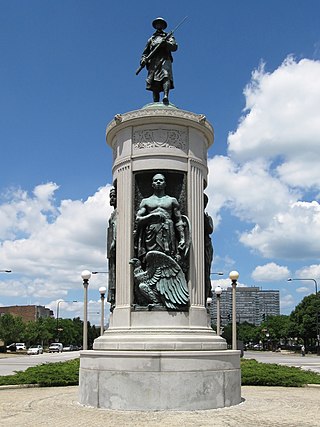
The South Side is one of the three major sections of the city of Chicago, Illinois, United States. Geographically, it is the largest of the three sections of the city, with the other two being the North and West Sides. It radiates and lies south of the city's downtown area, the Chicago Loop.

The King assassination riots, also known as the Holy Week Uprising, were a wave of civil disturbance which swept across the United States following the assassination of Martin Luther King Jr. on April 4, 1968. Some of the biggest riots took place in Washington, D.C., Baltimore, Chicago, and Kansas City.

The Chicago mayoral election of 1989 saw Democratic nominee Richard M. Daley win election to the remainder of an unexpired mayoral term with a 14% margin of victory. This marked a return for the Daley family to the office of mayor. Daley was elected over Alderman Timothy Evans, the nominee of the newly formed Harold Washington Party, and the Republican nominee Ed Vrdolyak.

Schaller’s Original Pump was the oldest bar and restaurant in Chicago, Illinois. Located at 3714 South Halsted Street, the Pump was opened in 1881 by George “Harvey” Schaller and was owned and operated by the founder’s descendants until its closure in 2017. It was a local landmark in the Chicago South Side neighborhood of Bridgeport.

The Chicago mayoral election of 1967 was held on April 4, 1967. The election saw Richard J. Daley being elected to a fourth term as mayor. Daley's main opponent was Republican nominee John L. Waner, who he defeated by a landslide 48% margin.


















